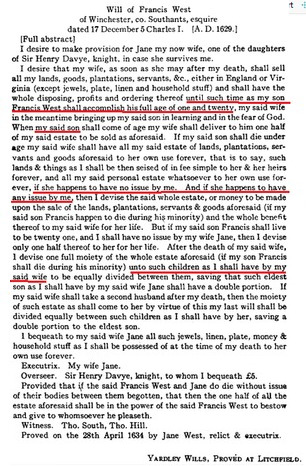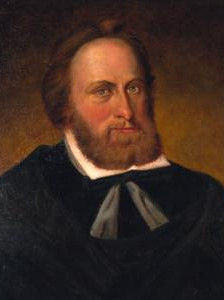Margaret Sherley (md 1626)
At least 1 Child:
Francis West (1627- )
2nd Wife:
Temperence Flowerdew (md 1628)
3rd Wife:
Jayne Davye (md 1629)
Father: Lord Thomas West
Mother: Lady Anne Knollys
Francis West (1586-1634) was an early settler of Jamestown who became a Deputy Governor of the Colony and Dominion of Virginia. His older brother Thomas West was Lord Delaware (3rd Baron de la Warr) who is attributed with being a major force in saving the struggling colony. His younger brother, Governor John West (1590-1659), served as Crown Governor of Virginia from 1635-1637.
 |
From July 30 through August 4, 1619, he served as an appointed representative in Jamestown's first Legislative Assembly. This was the first House of Burgesses appointed by Governor Sir George Yeardley. On 22 March 1622 the Indians killed two men on his plantation at Westover; he had another plantation at Sherley, so named from his connection with the Sherley family; both are on the James River. In November 1622 he was appointed Admiral to New England by the New England council, where he served alongside Capt. Christopher Levett, Governor of Plymouth, on a three-man council under Capt. Robert Gorges, named Governor General of the Plymouth Council for New England's venture in Massachusetts. Henceforth he divided his time between Virginia and New England. On 22 March 1628 he received a commission as Governor of Virginia (Cal. State Papers, Dom. Addenda, 1625-49, p. 272), an office which he held until 5 March 1629, when John Pott was chosen his successor. In that year West visited England, and opposed Lord Baltimore's project of founding a colony within the limits of Virginia. He had returned to Virginia before December 1631, and attended council there until 1633, the date of the last undoubted reference to him.
 |
Capt. West died in February 1634, apparently in a drowning accident. His will of August 1633 makes it clear that Francis was a very young son of an earlier marriage, which fits perfectly with Margaret being the mother. The will asks Jane to raise him until he is of age.
It has been a problem to identify his surviving son Francis West II or even who the mother is. She is sometimes listed with the surname Stitts or Whitney. The latter appears to be a mistake. On the other hand Stitt might be either her maiden name or the surname of first husband. Francis' will makes it plain that he had a son named Francis by an earlier wife who was still very young in 1629 when the will was made (see illustration) because he asks that Jane bring him up well. Some genealogies found in my research identify Francis as having been born in 1606 to Margaret in England, but that cannot be true because he would have been of age (over 21) when the will was made. He's also been identified as Francis John West, born in 1632 in Massachusetts and having his family there, which is neither the right area nor birth year.
Here I will add a suggestion from my own very limited research. Margaret's husband Capt. William Powell died in Jan 1623. In Feb 1623 a census was taken of all living, listed by location. Capt. Powell lived in Jamestown (James City at that time), and there is Margarett Shrawley listed as living there just a month after his death. Most women were listed as nameless wives right after their husbands: she would have likely been "his wife Powell" or "uxor Powell". Her full name being listed and not after a man with the same surname, implies she was not married. Thus, Shrawley might have been her maiden name and Stitt her first husband's surname or vice versa. Then again, her name might have been Margaret Sherley because it was noted that Francis had connections to the Sherley family. Ensign Sherley is listed on the 1623 census, who might have her relative. As this was being written, it was discovered there was indeed a Margaret Sherley christened on 1 Nov 1599 in St. Margaret, London, England to John Sherley recorded in England Births and Christenings in the SLC Genealogical Society FHL microfilm 908,519. She is from a noble family which fits with her marrying the leaders of the colony. Moreover, there are birth and death records for all of her siblings, but no marriage nor death record for her so she could have married in Jamestown. This looks good enough to add to my pedigree chart. It is certainly more plausible than anything else known to me.
In my pedigree chart there is a Francis West, son of another Francis West in the same area of Virginia at the correct time, so that is the line of descent shown, even though no direct information is known about who Francis II was nor whom he might have married. It is based only the fact that there are two Francis Wests in the same area who were apparently proud of that name!